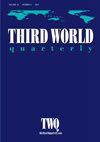Becoming a repair entrepreneur: an ethnography of skills training in Brazil
IF 1.8
2区 经济学
Q2 DEVELOPMENT STUDIES
引用次数: 0
Abstract
: Santa Efigênia in São Paulo is an important Latin American hub for buying and selling electronics. This article draws on long-term fieldwork to discuss repair training in the neighborhood. While scholars have looked at formal and informal educational spaces, this article looks at a new kind of institution that creatively combines aspects of street repair and high-end IT services. Individuals from all over Brazil seek out this popular private school with the expectation of becoming self-employed cellphone technicians. The article starts with a description of repair practices in Santa Efigênia and an analysis of the barriers to and accessibility of repair knowledge, including for the female ethnographer. It then centers on the school’s training sessions, examining how students are prepared to become repair entrepreneurs through a mix of technical skills and para-technical concerns with aesthetics, logistical speed, and networking. I show that this school redraws communities of practice, bringing new actors into repair while excluding others along social divisions of race, class, and gender. Engaging with critiques of the neoliberal push for entrepreneurship in development, I consider the contradictions of this institution, concluding with a discussion of how this case offers insights into the democratization and dissemination of repair knowledge. [ Electronics repair; Entrepreneurship成为一名维修企业家:巴西技能培训的民族志
本文章由计算机程序翻译,如有差异,请以英文原文为准。
求助全文
约1分钟内获得全文
求助全文
来源期刊

Third World Quarterly
DEVELOPMENT STUDIES-
CiteScore
4.10
自引率
15.00%
发文量
137
期刊介绍:
Third World Quarterly ( TWQ ) is the leading journal of scholarship and policy in the field of international studies. For almost four decades it has set the agenda of the global debate on development discourses. As the most influential academic journal covering the emerging worlds, TWQ is at the forefront of analysis and commentary on fundamental issues of global concern. TWQ examines all the issues that affect the many Third Worlds and is not averse to publishing provocative and exploratory articles, especially if they have the merit of opening up emerging areas of research that have not been given sufficient attention. TWQ is a peer-reviewed journal that looks beyond strict "development studies", providing an alternative and over-arching reflective analysis of micro-economic and grassroot efforts of development practitioners and planners. It furnishes expert insight into crucial issues before they impinge upon global media attention. TWQ acts as an almanac linking the academic terrains of the various contemporary area studies - African, Asian, Latin American and Middle Eastern - in an interdisciplinary manner with the publication of informative, innovative and investigative articles. Contributions are rigorously assessed by regional experts.
 求助内容:
求助内容: 应助结果提醒方式:
应助结果提醒方式:


